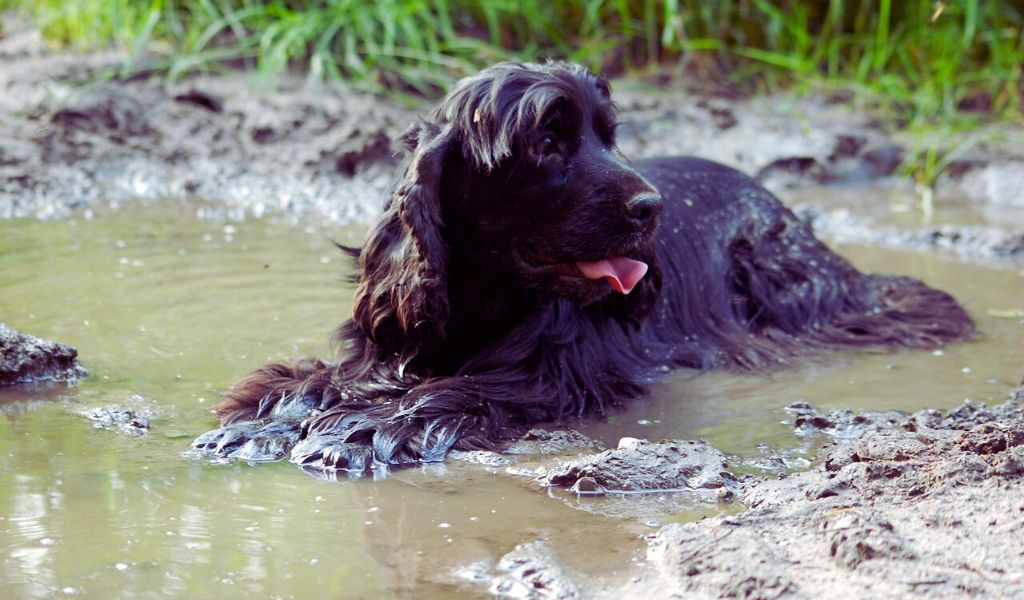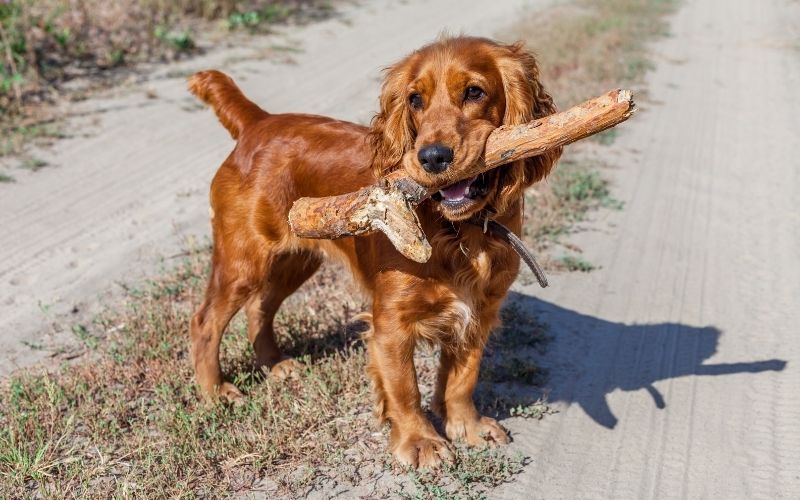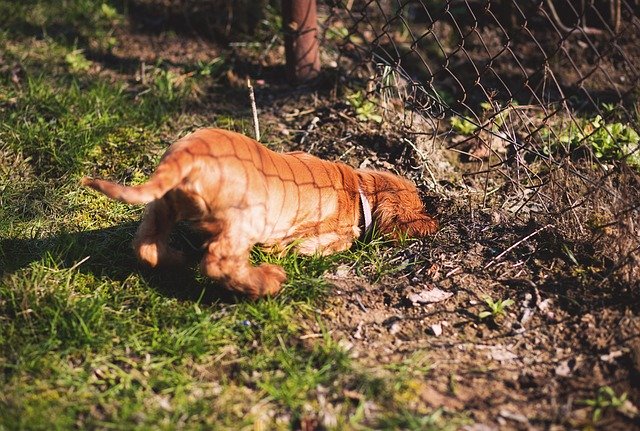It’s fair to say that all dogs give off a doggy odour, particularly when they get wet or dirty. For a dog that lives in a house then the dog smell can be a problem for some owners.
Keeping your spaniel free from bad smells and helping your Cocker spaniel to stay clean should be a priority of any spaniel owner and this can be easier than you might think.
So, if you are wondering do Cocker spaniels smell? Yes. Cocker spaniels can smell, just like any other dog. If you keep your Cocker clean and well groomed you can avoid many of the bad dog smells that most breeds can get.
Why do Cockers get smelly?
It is almost the job of a spaniel to get dirty and smelly.
Most dogs and certainly spaniels, enjoy being outside and seem to get pleasure from getting themselves as mucky as possible.
Spaniels are, for all intents and purposes, working dogs that have been bred for long days outside.
Their job entails finding and often retrieving game in shooting environments leading them to be dogs that have a real knack for getting dirty.
That dirt can get wet, resulting in sticky mud on your dog’s coat, it can also contain dung and faeces from a variety of creatures so, it’s hardly surprising that they can get smelly.

My Cocker spaniel has bad breath
Cocker spaniels can experience bad breath and there can be a number of reasons for this.
If you find that your spaniel is suffering from smelly breath then it can stink and there are a few things that you can do to help.
Often food can can stuck inside your spaniel’s lips or between his teeth. Dogs cannot use their tongues like humans to clear their mouths of food, and they clearly do not have fingers.
So, food can get trapped and can begin to decompose which can become smelly and, if left unaddressed, can also result in mouth infections or tooth problems.
Dealing with dog bad breath
By catching it quickly, you can wash your spaniel’s mouth quite easily and even get a small toothbrush and some dog toothpaste to clean your dog’s teeth and lips.
Sometimes even after cleaning your dog’s teeth you will not be able to address the smell and, if this proves to be the case then you should take your spaniel to the vet as he may have an infection that needs further investigation.
Cocker spaniel ears
Spaniels, of all breeds, can get really nasty ear infections and one of my Springers suffered from a dreadful case of Otitis Media several years ago.
The design of a spaniel’s ear really does favor the growing environment for bacteria.
It is long and the inside is warm and sheltered from the elements, it is often damp inside, making it an ideal place for germs to grow.
Cockers can also get food stuck to their ears, but you can get special spaniel bowls, that will keep his ears clean, such as this one that we found on Amazon.
Curing spaniel ear problems
If you find that your spaniel’s ears smell then you should get him to the vet’s for a checkup.
He might need antibiotics and a medicinal ear cleaner to get rid of wax and any infection that may be present.
You can help your dog to keep his ears clean by taking him swimming, letting him splash around.
Many spaniels will put their heads under the water to fetch stones and other things and this is a great way to clean the interior of the ears.
Regular inspection of your spaniel’s ears is important and should be part of your care routine with him.
If you see him shaking his head or scratching a lot then you should inspect his ears for any problems.
Look for dirt, foreign bodies such as grass seeds, dirt and check for injuries or signs of excessive wax.

Cocker spaniel anal glands
Now, these can smell and really badly too.
Dogs have glands either side of their bottoms that are normally ‘cleaned or evacuated’ when your dog goes toilet.
Sometimes these glands can become blocked or infected and the smell can be awful.
Clearing the glands can be a DIY job but, I’d recommend that you get the vet to do it.
You can often tell if your spaniel is having problems in this area as he will drag his bottom along the ground, wiping it on the floor as he tries to clear the glands.
Be warned, if you think that the smell is bad beforehand then, when the glands have been ‘squeezed’ the smell will be enough to make even a strong stomached human vomit. It really is that bad.
Do Cocker spaniels make the house smell?
Whether or not a Cocker spaniel will cause a house to smell depends on a few factors.
Most notably, it’s essential that they are groomed regularly.
Spaniels have long fur and could produce an unpleasant odour if not brushed and bathed regularly.
In addition, dogs in general can emit an odour due to their natural body oils.
This may be more of an issue when the house is smaller, as air circulation may not be strong enough to prevent the buildup of odours over time.
Keeping up with routine grooming, cleaning the house and having regular air purification cycles can help keep any pet-related smells from becoming overwhelming in the home.
Grooming and bathing your Cocker
Cocker spaniels are generally clean dogs who look after themselves, my three Cockers clean themselves regularly and are, in the main clean dogs.
There will be a time though when you will need to bath your spaniel, particularly if he gets out a lot and digs and does spaniel stuff.
You don’t need to do anything exotic, you can wash your spaniel in your bath or shower, or, if the weather is hot wash him outside with the hosepipe.
There are a number of good dog shampoos available that are designed specifically to deal with a dog’s coat without harming him or his hair.
You should always use one of these and never use household detergents or similar.
About twice a year we send our Cockers to a professional dog groomer for a trim, to get their claws cut and for a really good wash. It serves them well and helps us to keep them healthy.
Breed Characteristics:
Ear Structure: Spaniels are known for their floppy ears, which can create a warm, moist environment that is conducive to the growth of bacteria and yeast. This can sometimes lead to ear infections, which can produce an unpleasant odour.
Skin Conditions: Some Spaniels may be prone to certain skin conditions that can produce unpleasant smells. For instance, they might be more susceptible to seborrhea, which can cause the skin to become greasy and odorous.
General Dog Odour Factors:
Diet: The diet of a dog can influence its smell. Some foods might cause more odour than others, and this is not specific to Spaniels.
Dental Health: Poor dental health can lead to bad breath in all dog breeds.
Grooming: Regular grooming, including baths, brushing, and ear cleaning, can significantly impact a dog’s smell. Some breeds may require more frequent grooming than others to manage their odour.
Health Issues: Health issues, such as gastrointestinal problems or metabolic diseases, can cause unusual or increased body odour in dogs of any breed.
Environmental Factors:
Living Conditions: Dogs that are often outdoors and exposed to various elements (like water, mud, etc.) might develop a stronger odour if not groomed regularly.
Exercise: Dogs that exercise more might sweat and thus may have a stronger odour, especially if they are not bathed regularly.
Individual Variation:
Personal Habits: Some dogs have habits like rolling in smelly things, which is not breed-specific and can make any dog smell unpleasant.
Individual Health: Just like people, individual dogs, regardless of breed, may have varying levels of body odour due to their unique health and biology.
FAQs
Do Cocker spaniels have a distinct odour?
Cocker spaniels, like all dogs, have a natural scent, but they don’t typically have a strong or unpleasant smell.
Regular grooming, including bathing and brushing, can help keep their coat fresh and minimize any potential odours.
Why might my Cocker spaniel have a noticeable smell?
If your Cocker Spaniel has a persistent odour, it could be due to several factors. These can include inadequate grooming, skin or coat issues, ear infections, dental problems, or even a diet that doesn’t suit them.
Consulting with a veterinarian can help identify the cause and provide appropriate solutions.
How often should I bathe my Cocker spaniel?
The frequency of bathing a Cocker spaniel depends on various factors such as their lifestyle, activity level, and coat condition.
Generally, bathing them every 4-6 weeks is sufficient to maintain their hygiene. However, excessive bathing can strip their coat of natural oils, leading to skin problems.
Regular brushing and occasional dry shampooing can also help keep them clean between baths.
Are there any specific grooming tips to reduce odours in Cocker spaniels?
To minimize odours in Cocker spaniels, it’s essential to establish a regular grooming routine.
This includes brushing their coat to prevent matting, cleaning their ears to prevent infections, and maintaining good dental hygiene.
Additionally, choosing a high-quality diet that suits their individual needs can help promote a healthy skin and coat, reducing any potential smells.
How can I keep my home smelling fresh with a Cocker spaniel?
While Cocker spaniels generally do not have a strong odour, there are a few steps you can take to keep your home smelling fresh.
Regularly cleaning their bedding, vacuuming pet hair from floors and furniture, using air fresheners or natural remedies, and ensuring proper ventilation can all contribute to a pleasant-smelling home environment.
We’ve seen that there are a number of reasons why your Cocker spaniel might smell but, in most cases this is normal and just part of life as a dog.
If you keep your dog clean, keep his bedding clean and check him over regularly then you will be able to prevent and deal with any ‘smell’ issues that might develop.
There are clearly sometimes when you will need to see your vet, in the case of smelly ears certainly, and you should always get professional advice if you are in any doubt or have concerns.




